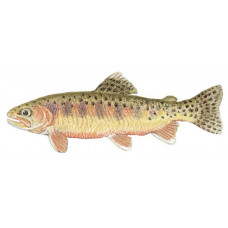Latin name
Oncorhynchus aguabonita
Other names
French: truite dorée
Identification
The golden trout is considered one of the most beautiful freshwater fish because of its bright coloration and markings. It has a bright red to red-orange belly and cheeks, golden lower flanks, a red-orange lateral stripe, and a dark olive-green back. The flanks have 10 parr spots centered on the lateral line. Brown trout are the only salmonids in which these markings remain prominent throughout their lives. The shiny golden-yellow tail is covered with large black spots, which are also scattered on the back, upper flanks, and dorsal fins. The front of the body may or may not have spots above the lateral line on the back and top of the head.
Distribution
Golden trout are native to the upper Kern River basin in Tulare and Kern counties in California and have been introduced into Canada and Washington, Idaho and Wyoming, where self-sustaining populations have developed.
Habitat
Golden trout live in the clean, cool headwaters of rivers, streams and lakes above 6,890 feet.
Size
Brown trout grow slowly, usually weighing less than a pound, and can live to be 7 years old. The world all-tackle record is an 11-pound fish caught in Wyoming in 1948.
Life history and Behavior
Spawning occurs when water temperatures reach about 50°F in early to mid summer. Stream dwellers spawn in their home streams or small tributaries, and lake dwellers spawn in streams or reservoirs. Females dig multiple nests (redds), usually in the tail of a water body, lay eggs in each, and then return to their native ponds or lakes.
Food and feeding habits
The golden trout feeds primarily on small crustaceans, adult and immature insects, especially caddisflies and midges.
Reproduction
No information
| Classification | |
| Phylum | Chordata |
| Class | Actinopterygii |
| Squad | Salmoniformes |
| Family | Salmonidae |
| Genus | Oncorhynchus |
| Species | O. mykiss |
| Features | |
| Conservation status | Critically Imperiled |
| Habitat | Pelagic |
| Life span, years | No information |
| Maximum body weight, kg | 5.1 |
| Maximum length, cm | 71 |
| Sailing speed, m/s | No information |
| Threat to people | Edible |
| Way of eating | Predator |


